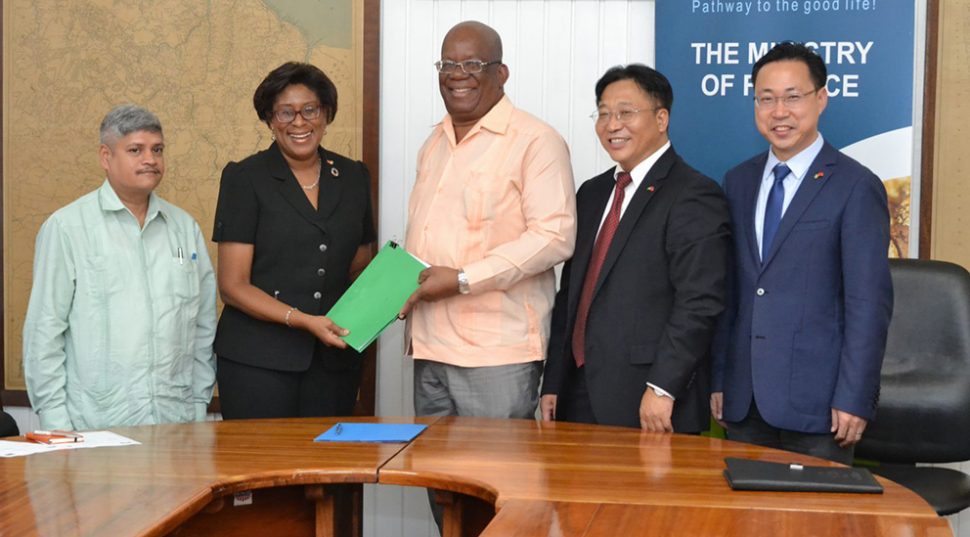The National Broadband Project moved closer to reality yesterday following the signing of a US$37.6 million loan agreement between Guyana and China and it should be completed by mid-2020.
The project, Finance Minister Winston Jordan said, aims to address existing gaps within the e-government network by improving the delivery of services to citizens in the areas of health, education, security and business and government administration.
Jordan and Chinese Ambassador to Guyana Cui Jianchun signed the loan agreement during a ceremony at the Ministry of Finance, where it was disclosed that the loan is repayable over 20 years, with a five-year grace period, at an interest rate of 2%.
“The project represents the first phase of national broadband connectivity …and in other phases roll out will be done to the wider public services and across the ten administrative regions. It also envisages an alternative subterranean cable connectivity to improve broadband services for the public and private sectors in furtherance of the liberalisation of this sector,” the minister said during his remarks.
He stated that the implementation of this project will see additional long-term evolution towers and the equipping of an additional data centre. He said that it will strengthen also the capacity of personnel in all sectors, to “provide improved services and to transform the ICT environment in Guyana”.
He added that according to the 2016 World Development Report, investment in broadband technology drives economic growth and development by contributing to job creation, sparking innovation, supporting digital entrepreneurs and stimulating improved public services.
The minister said that government envisions that this project will herald the introduction of a number of benefits to the country, for instance, from an economic standpoint it is expected that the project will be a catalyst of efficiency, productivity and profitability for the development of large, medium and small businesses, thus allowing them to compete globally and regionally.
In the area of public services, he said that the project will assist in improving the quality delivery of public services and “reduce the cost of access to social services including education, health care and public safety.”
Importantly, he stressed, the implementation of the project will help to support government’s efforts towards the establishment of a green environment where e transactions will be introduced to “pave the way for a paperless environment.”
Jordan also made mention of the failed fibre optic cable project undertaken by the last administration to bring cheaper internet to Guyana but which “as we all know by now that project failed miserably, in the process costing taxpayers and leaving a mountain of debt that has to be repaid.”
The minister stressed that the signing is a “testimony” to government’s commitment to make a reality of “what others bungled.”
Safe city coming
Meanwhile, Public Telecommunications Minister Catherine Hughes emphasised that the safe city component, which is set to become an important crime-fighting tool, is among the priorities under the project.
“It means that our police force will have the means—we are talking about digital licence plates, we are talking about police cars that will be internet ready and have internet access to improve the timeliness of police response,” she explained, before adding that every police station will be connected via the internet, making communication and the transference of documents easier.
If a rank is on the road, she said, driver’s licence information, for instance, would be at hand reach and through a command centre, response time to crimes will be shortened.
According to the minister, a lot of “base” work has already been done, particularly regarding what needs to be purchased for the creation of the smart classrooms in the education component.” She explained that the concept of the smart classroom is that equipment will be put into specific training institutions and high schools that would allow a teacher or trainer to connect with any school anywhere.
“This technology and the opportunity to implement it, is what we call the start of eliminating the digital divide which simply meant that if you were in locations usually hinterland, poor or remote communities in Guyana you were severely disadvantaged and I am happy that we are well on our way to correcting that,” she said.
In terms of health, she said that the project would allow for all health centres and regional hospitals to be connected via the internet as well as for the creation of a space in those facilities to facilitate telemedicine.
“This project is a game changer. This project could truly start the transformation of Guyana,” she said before reminding the naysayers that Guyana has a generation of young people who are already using the technology.
Hughes informed that the project also caters for the training of persons, including the police. Currently, she explained that the ministry through its Industry and Innovation Unit has trained over 600 individuals from Essequibo, Linden and Bartica since the start of the year in the areas of website design, using the computer, coding and STEM (Science, Technology, Engineering and Mathematics). She stressed that the project has a very important training component because the government recognises that “we can’t put the technology in place and not train individuals to use.”
At this point, she said the school component will be implemented in a regional way. The technical institutes, the National School of Agriculture, which already had internet access will have the opportunity to have a smart classroom.
Ambassador Cui, in brief remarks, said that this is a clear sign of transparent business in Guyana and indicates that his government is committed to helping Guyana and its people.
The Ambassador said that China believes that the ICT industry plays a very important role in a country’s development strategy.
“…If we don’t start today maybe three or five years later, we would have to bear the serious consequences,” he said, before adding that the project presents a good opportunity for Guyana to set a solid foundation.






